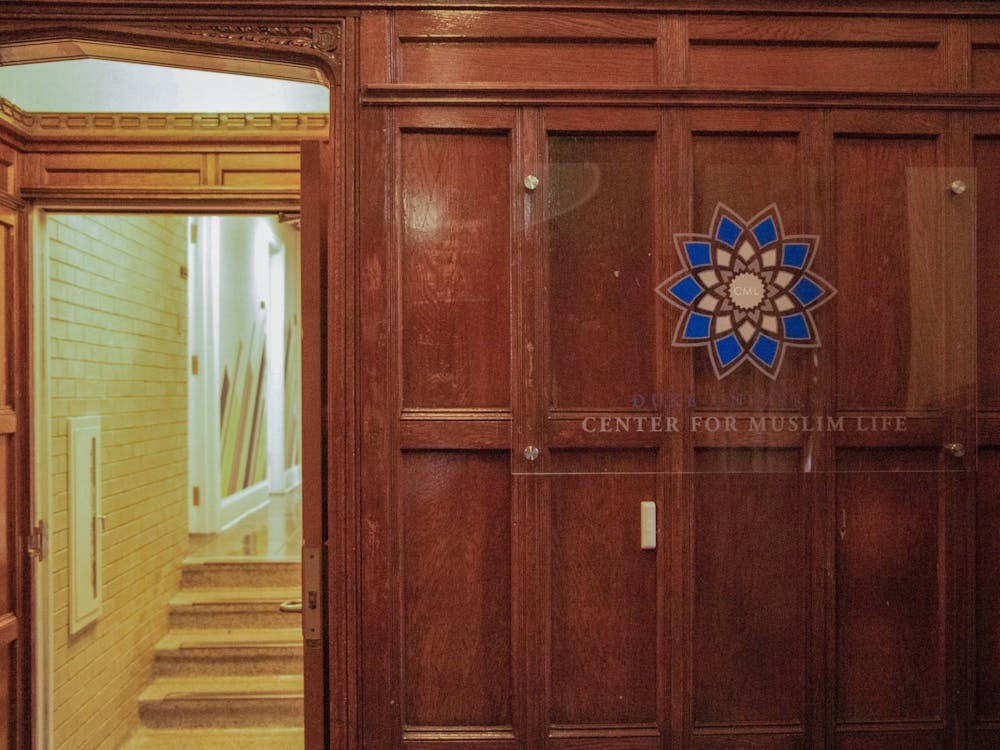Duke’s Center for Muslim Life hosted an educational workshop for students, faculty and staff Thursday to increase awareness of the impact of Islamophobia and the diversity of the Muslim community at Duke and across the country.
Joshua Salaam, chaplain and director of the CML, and Hadeel Hamoud, program coordinator of the CML and Trinity ‘22, co-facilitated the workshop, titled Been Here, Still Here: Muslims & Islamophobia in the United States.
“We see our role in the big Duke plan of trying to make this a campus where so many different people can feel comfortable,” Salaam said. “That’s a huge task that is easy to fail at, but if we continue doing this as other departments continue to educate and explain their position, understanding their reality, I think it helps for us to achieve that reality.”
The CML provides regular educational training for the Duke community. Hamoud views these training sessions as an opportunity to “speak directly to the Duke campus community and educate them on what the Muslim community looks like, who we are and how they can create a more inclusive campus climate.”
The workshop included four sessions focused on defining key concepts related to Islam, the history of Muslims in the United States, Islamophobia and future efforts to empower the Muslim community on campus.
Attendees began by sharing their personal perceptions of who Muslims are based on media influences and interactions with family and friends. Salaam and Hamoud then discussed what being Muslim means, what Islam is and what it means to practice Islam.
The co-facilitators also spoke about the demographics and identity of Muslims at Duke, who make up approximately 4% to 6% of the Duke student body, or approximately 640 students.
The workshop session also offered a historical perspective on the history of Muslims in the United States, discussing the early history of Muslims in the country prior to its founding, waves of migration from other countries, the impact of legislation on migration and the rise of Islam within the Black community.
Salaam and Hamoud described Islamophobia as a “system of oppression upheld by institutions, policies and rhetoric” that manifests in popular media and public discourse, policy and violence. Discussions centered on orientalism and the racialization of Muslims as two major tools for understanding Islamophobia.
Part of the section focused on liberal Islamophobia, a form of Islamophobia that “sees Islam as inimical to liberal values and in conflict with American identity,” according to the facilitators’ presentation. Examples of liberal Islamophobia included beliefs that wearing hijab is “suffocating and oppressive,” that Muslims must “step up and reform Islam,” and that Muslims are homophobic.
The final session of the workshop focused on what attendees can do to support the Muslim community on campus and address Islamophobia, emphasizing the importance of reporting incidents of Islamophobia, furthering personal education and promoting inclusion.
Calvin Rausch, a Hunger Corps volunteer for service in America at Duke, works to improve food security on campus and attended the workshop because she values a “holistic response” in supporting students.
“Knowing more about student identities in places that I may not necessarily share with them is really important to me to ensure that they feel that they are being supported where they are at,” Rausch said.
Kevin D’Arco, senior associate dean of international students, also shared similar experiences from attending the workshop. He appreciated the opportunity to learn from participants’ and the facilitators’ life experiences, and felt that the training “helped highlight the importance of having a critical eye on how Muslims are framed in the news or popular culture.”
“Part of our mission is to help Muslim students on campus flourish, and that ability to flourish has a lot to do with how their professors and how other students view them, so we felt like we have a role and have resources to help the campus understand what Islam is and who Muslims are,” Salaam said. “That way, behind some door, in some classroom, in some dorm room that we will never get to, it will help a Muslim student in their daily life.”
Get The Chronicle straight to your inbox
Sign up for our weekly newsletter. Cancel at any time.
Amy Guan is a Pratt senior and a senior editor of The Chronicle's 119th volume.

